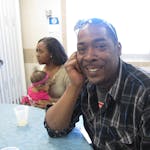Students at Augsburg College whose primary language was not English found an instant friend in Don Steinmetz: During orientation week, the linguistics and languages professor would welcome them to the Minneapolis liberal arts school by greeting them in their native tongue.
Steinmetz, who taught at Augsburg for 41 years, was known to be fluent in at least a dozen languages, and on the rare occasion that a student spoke a language he didn't know, he made an appointment with them and learned it, said former student Curt Rice, who now is a linguistics professor and researcher at Tromso University in Norway.
"He had an insatiable curiosity, enthusiasm and love of languages," Rice said. "One of the exotic things about him was his language mastery and advanced proficiency in scores of languages, and his passion was about awakening the interest in his students."
Steinmetz died of an apparent heart attack Dec. 28 while at United Hospital in St. Paul. He was 71.
He learned German from his parents and Russian from a neighboring family before he dropped out of Stillwater High School and went to the University of Minnesota to study German. He earned bachelor's, master's and doctoral degrees in German and was teaching the language to undergraduate and graduate students at age 22. He won a Fulbright Scholarship to study in Germany in 1959, said his son Erik, who teaches in the Computer Science Department at Augsburg.
Steinmetz arrived at Augsburg in 1968 and taught courses in German, Spanish, Chinese, Hebrew, Yiddish, Dutch and linguistics. His knowledge in the area of grammatical gender in languages made him a leading expert in the field. He spoke at conferences worldwide, and his research for linguistics was published in scholarly journals such as Lingua, Word and Recent Insights Into Germanic Linguistics, Rice said.
"If I ever had a grammar question, he would know the answer," said Mary Kingsley, who taught Spanish and was former chair of the Department of Modern Languages at Augsburg. "He knew things so well, and he could make it crystal clear. He made it interesting, and students could see that they had a genius before them."
His knowledge in languages was so vast that "he could teach an introductory course in any language," Kingsley said. But what students appreciated was that he taught them to discover their interests and pursue them, Rice said.
Outside the classroom, Steinmetz enjoyed traveling. He read works by German poets Johann Wolfgang von Goethe and Friedrich Schiller, including a work in which they told how they toasted the arrival of the new century in 1800 while at a New Year's party in Weimar, Germany. Steinment traveled to the exact spot on Dec. 31, 1999, to "return the toast," his son said. He also liked to cook.
In addition to his son Erik, of Minneapolis, Steinmetz is survived by his wife, Annelies, of St. Paul; four other sons, Peter and Thomas, of Minneapolis, Jonathan, of Stillwater, and Robin, of St. Paul, and six grandchildren.
The family held a private memorial service last week.





